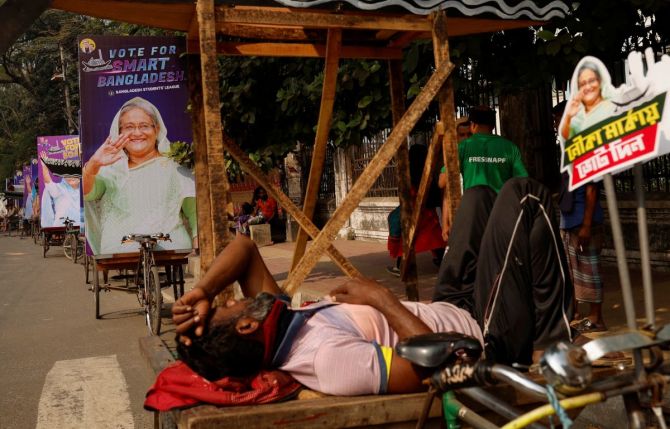Nearly 170 million people in Bangladesh will vote to elect 299 lawmakers during the 12th national election on Sunday amid a boycott by the main opposition Bangladesh Nationalist Party led by former Prime Minister Khaleda Zia, after PM Sheikh Hasina denied its demand to resign and let a caretaker government run the election.
More than 42,000 polling stations are set for Sunday’s (January 7) elections, where a total of 119.6 million registered voters are eligible to cast their votes, as reported by the country’s Election Commission.
Women make up almost half of the nearly 120 million eligible voters, while first-time voters number about 15 million.
As per the reports, Prime Minister Sheikh Hasina is expected to win a fourth straight term in the absence of the main opposition BNP which on Saturday (January 6) began a 48-hour nationwide strike against the “illegal government” amidst violence and a crackdown on protesters.
The Supreme Court on December 27 provided clearance for the Election Commission (EC) to proceed with the general elections.
Highlighting the security concerns, the Directorate General of Health Services (DGHS) has instructed private hospitals and clinics across Bangladesh to keep health services operational and to remain prepared to handle emergencies from Saturday to Wednesday, as reported by the Dhaka Tribune.
The directive was issued in a letter signed by DGHS Deputy Director Abu Hussain Md Moinul Ahsan.
This letter was sent to the president, secretary of the Bangladesh Private Clinic Hospital and Diagnostic Center Owners Association, and the president of the Bangladesh Private Medical College Owners Association, among other relevant parties.
As per the letter, private clinics, hospitals, and medical college hospitals must remain fully prepared to handle any emergencies during and after the election until January 10, according to Dhaka Tribune.
Bangladesh Prime Minister Sheikh Hasina has promised to maintain cooperation and friendly relations with India if she is re-elected in the parliamentary polls next month.
The reaffirmation came as she unveiled the manifesto of the ruling Awami League party in December, for the upcoming general elections.
Hasina underlined that if her party secures victory, Bangladesh will persist in its development collaboration with all nations, highlighting its commitment to fostering positive diplomatic ties and cooperation.
Specifically mentioning India-Bangladesh ties, the manifesto states, “The long-standing problem of demarcation of land boundaries and exchange of enclaves with India has been resolved. This achievement has encouraged continued multilateral cooperation and friendly relations with India.”
Moreover, earlier on Friday (January 5), three members of the Election Commission of India (ECI) arrived in Dhaka ahead of Bangladesh’s 12th general elections. They will actively participate as part of the international election observer team, contributing to the monitoring process.
The Election Commission has made thorough arrangements for the upcoming 12th national parliamentary election on January 7 to ensure a peaceful process.
As many as 127 foreign observers will track the election process to assess the election’s fairness.
International election expert teams from the European Union are present in Dhaka, with foreign observers from various countries, including a Commonwealth team, set to monitor the elections.
Despite the preparations, the opposition Bangladesh Nationalist Party has decided to boycott the polls. To prevent voting, the BNP has started a 48-hour strike commencing on Saturday (January 6) to demand the resignation of Prime Minister Sheikh Hasina’s “illegal government,” the Dhaka Tribune reported.
Under the leadership of former Prime Minister Khaleda Zia, the BNP has decided to boycott the general election scheduled for today. The party is advocating for the formation of an interim non-party neutral government to oversee the election, a demand that has been rebuffed by the government led by Prime Minister Hasina.
The BNP will carry out processions, mass campaigns and distribute leaflets against the polls across the country, as reported by the Dhaka Tribune.
Moreover, the second day of the hartal coincides with the election, which has already gathered global attention.
Adding to the already existing hurdles, the Bangladesh Election Commission’s election application, “Smart Election Management BD” crashed on the eve of the general elections.
The Tk21 crore app, launched by the Election Commission for voters to find election-related details, including polling centre locations, stopped working a day before the polling date.
Furthermore, at least 14 polling centres and two schools in 10 districts of Bangladesh were set on fire between Friday (January 5) evening and early Saturday (January 6) hours before general elections, as reported by the Dhaka Tribune.
However, the general elections in Bangladesh will witness participation from approximately 30 countries and 180 overseas observers, signifying international interest and observation in the electoral process.
(With inputs from ANI)





















Comments